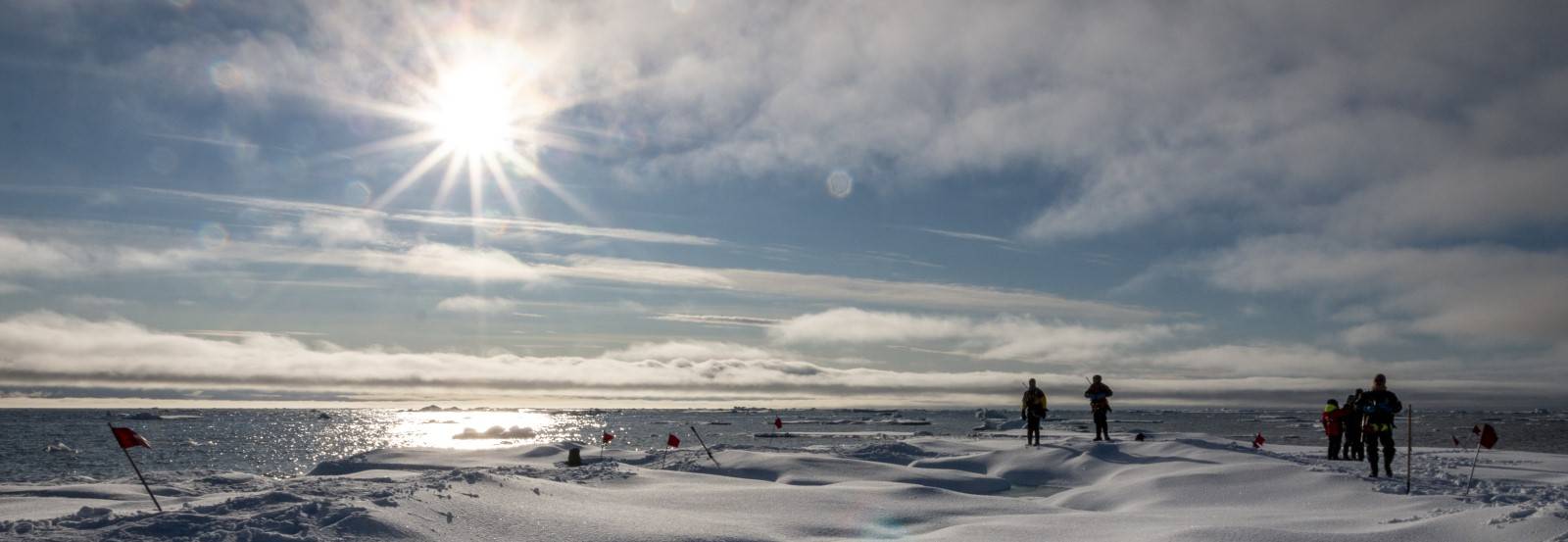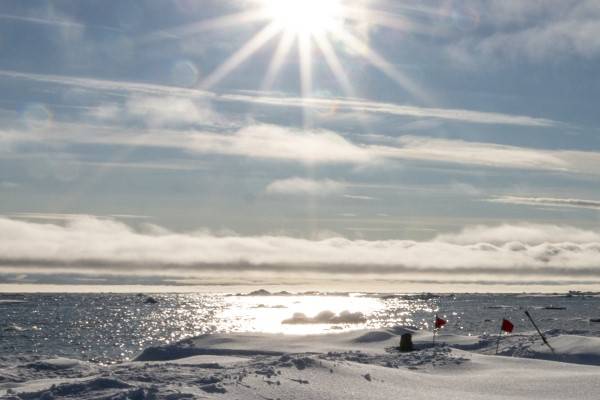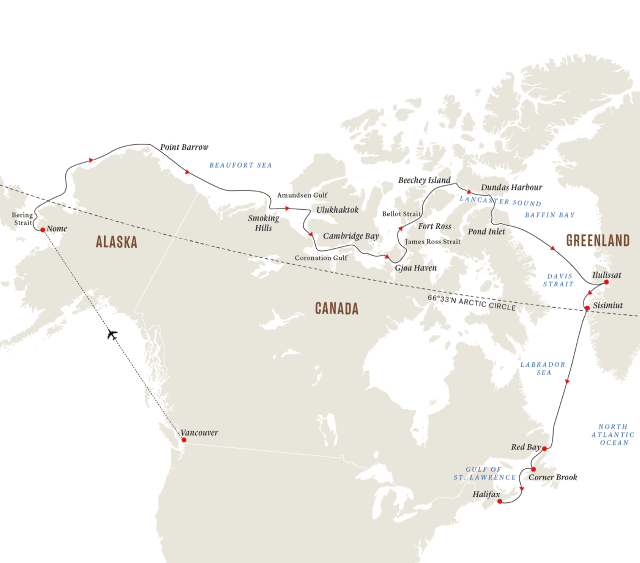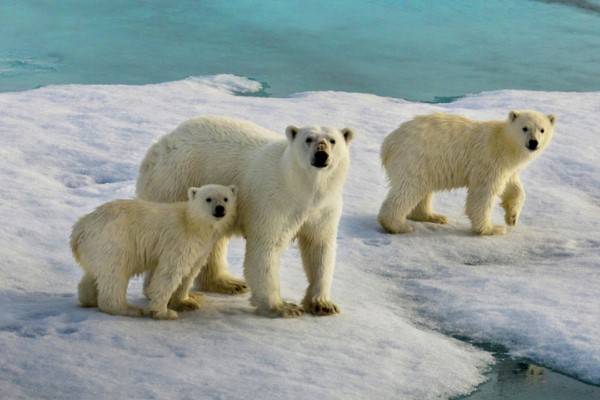HIGHLIGHTS
- A
voyage of legend that attempts to cross the Arctic through the famous
Northwest Passage
- Meet
local Inuit during visits to remote yet welcoming communities in Canada
and Greenland
- Spot
magnificent Arctic wildlife, with good chances to see polar bears,
whales, and walrus
- Beautiful,
pristine, and rarely-seen landscape made up of mountains, icebergs, and
fjords
Best time to visit
The
Northwest Passage is only accessible by ship between July and
September. This is the only time of the year the ice has reduced enough
to allow a crossing attempt. July and August are also the peak months
to spot wildlife. For example, polar bears are particularly active,
hunting whales and seals along the floating sea ice. The summer days
are long, which help maximize our chances of wildlife sightings.
What to Expect?
If you decide to go, you’ll find a magical unspoiled world in
the High Arctic, with beautiful scenery, glaciers, and an icy
landscape. You might see majestic polar bears out hunting, different
species of whale breaching, walrus relaxing by the shore, and a variety
of birds. Remember that these are natural Arctic habitats, so we
can’t guarantee that certain animals will appear during your
expedition. You will experience both the modern life of the Inuit
population and their communities, culture, and life, and learn more
about the history of the region.
- Both on board
and on land, there’s a lot going on to make the
most out of your journey. Here are some of the most popular activities:
- Small-boat
cruising in one of the most remote parts of the world. The
ship will not be able to dock everywhere and anywhere. That’s
why each ship has small explorer boats to take you ashore or on
ice-cruising excursions.
- Nature
landings are landings on beaches and shore areas. They
happen wherever possible.
- Hiking
is another popular activity. This could be at places of historical,
biological, or geological interest, small settlements, or places that
offer stunning natural beauty.
- Lectures and
science program. When the ship is at sea,
there’s plenty happening on board as well. Join in-depth
lectures on a variety of topics from history and culture to wildlife
and science. The Science Program invites you into the fascinating world
of science, and enhances the experience and your understanding of the
regions we explore.
- Photo program.
There is a professional photographer on board you can access for hints
and tips, camera set-up, and simply how to take great pictures.
DATES / RATES
Rates are listed per person
|
| Start Date | End Date | From EUR | From USD |
|---|
| Aug 08, 2025 | Sep 02, 2025 | EUR |
USD 22,400 |
| Aug 10, 2026 | Sep 04, 2026 | EUR |
USD 22,600 |
Rates are listed per person
|
| Start Date | End Date | From EUR | From USD |
|---|
| Aug 08, 2025 | Sep 02, 2025 | EUR |
EUR |
| Aug 10, 2026 | Sep 04, 2026 | EUR |
EUR |
ITINERARY
Day 1 :Setting Out from Scenic Seattle
Day 2:There's no place like Nome
Days 3–6:Along the Alaskan Coast
Days 7–14:Exploration and Adventure
Day 15:Into Bellot Strait
Days 16–20:The Eastern Canadian Arctic
Day 21:Crossing Baffin Bay
Days 22–24:The Wonders of West Greenland
Day 25:Old and New in Nuuk
Day 26:Cosmopolitan Reykjavík
MS Roald Amundsen (Expedition, 500-guests)
Named after the first man to cross Antarctica and reach the South Pole, MS Roald Amundsen leads the way towards an even more sustainable way of traveling. The ship is specially constructed for voyages in polar waters. It serves as a comfortable base camp at sea - bringing adventurers from all over the world to the most spectacular destinations in the most sustainable way.
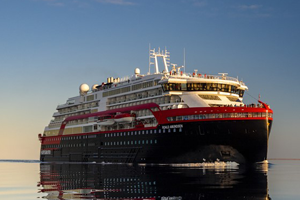 (Click image to view Ship details)
(Click image to view Ship details)
WHAT'S INCLUDED
Hotels
- Overnight in Vancouver before the expedition cruise
including breakfast
Flights
- Coach-class flight from Vancouver to Nome
Transfers
- Transfer from the hotel in Vancouver to the airport before
the expedition cruise
- Transfer from the airport to the ship in Nome before the
expedition cruise
Expedition Cruise
- Expedition cruise in a cabin of your choice
- Breakfast, lunch, and dinner including beverages (house
beer and wine, sodas, and mineral water) in restaurants Aune and
Fredheim
- À la carte restaurant Lindstrøm
included for suite guests
- Complimentary tea and coffee
- Complimentary Wi-Fi on board. Be aware that we sail in
remote areas with limited connection. Streaming is not supported.
- Complimentary reusable water bottle to use at water refill
stations on board
- English-speaking Expedition Team who organize and accompany
activities on board and ashore
- Range of included excursions
Onboard Activities
- Experts on the Expedition Team deliver in-depth lectures on
a variety of topics
- Use of the ship’s Science Center, which has an
extensive library and advanced biological and geological microscopes
- Citizen Science program allows guests to assist with
current scientific research
- Professional onboard photographer gives top tips and tricks
for the best landscape and wildlife photos
- Use of the ship’s hot tubs, infinity pool, sauna
with floor-to-ceiling window, outdoor and indoor gyms, and outdoor
running track
- Informal gatherings with the crew such as daily recaps and
preparation for the day to come
Landing Activities
- Escorted landings with small explorer boats
- Loan of boots, trekking poles, and all equipment for
activities
- Complimentary wind- and water-resistant expedition jacket
- Expedition photographers help with your camera settings
before landings
Not Included In Your
Expedition
- International flights
- Travel protection
- Luggage handling
- Optional shore excursions with our local partners
- Optional small-group activities with our Expedition Team
- Optional treatments in the onboard wellness and spa area
Notes
- All planned activities are subject to weather and ice
conditions
- Excursions and activities are subject to change
- Medical declaration form is mandatory
- Please ensure you meet all visa entry requirements
- No gratuities expected
What’s included
- Overnight in Seattle before the expedition cruise,
including breakfast
- Overnight in Copenhagen after the expedition cruise,
including breakfast
- Economy class flight from Seattle to Nome before the
expedition cruise
- Economy class flight from Nuuk to Copenhagen after the
expedition cruise
- Transfer from the hotel to the airport in Seattle
- Transfer from the airport to the ship in Nome
- Depending on the hotel location luggage only or bus
transfer from the airport to the hotel in Copenhagen after the
expedition cruise
Expedition Cruise
- A stay in a cabin of your choice
- Daily breakfast, lunch and dinner
- Wine, beer and spirits available at meals and throughout
the day and evening (subject to licensing laws, excludes premium drinks)
- All day coffee, tea and soft drinks
- Meals and take-away available throughout the day during
Fredheim restaurant opening hours
- Fine dining in restaurant Lindstrøm included for
suite guests
- A complimentary water bottle to refill on board and take
home
- A polar expedition jacket, a backpack, or another piece of
HX kit
- Professional photos from your trip taken by our onboard
photographer
- Complimentary Wi-Fi. Please note, streaming is not supported
- Use of sauna, hot tubs, pool, fitness room, lounges and more
- Gratuities included. Fantastic service is standard at HX
– though if you’d like to leave something extra,
it’s always appreciated
- Range of included activities
Onboard Activities
- In-depth lectures and discussions hosted by experts on the
Expedition Team
- Full access to the ship’s Science Centre
- Citizen Science Programme allows guests to assist with
ongoing scientific research
- Professional onboard photographer gives tips and tricks for
the best landscape and wildlife photos
- Informal gatherings with the crew for daily briefings
Landing Activities
- Escorted landings with small expedition boats
- Loan of boots, trekking poles and all equipment for
activities
- Expedition photographers on hand to assist you
Notes
- All planned activities are subject to weather and ice
conditions
- Excursions and activities are subject to change
- Please make sure you meet all entry and boarding
requirements
- Depending on your flight times, an additional overnight
might be needed (not included)
Not Included
- International flights
- Additional overnight stay(s) may be required due to the
timing of international flights
- Travel insurance
Luggage handling
- Optional shore excursions with our local partners
- Optional small-group activities with our Expedition Team
- Optional treatments in the on-board wellness and spa area
Notes
- - - Attempted route, ice conditions dependent
Our Attempts are voyages where we challenge the elements in true
expedition style. As we explore these remote and captivating areas in a
safe way, our adventure will ultimately be guided by nature. If
weather, sea or ice conditions do not allow our planned navigation, our
experienced crew will deliver an adapted itinerary. Flexibility and our
deep knowledge of the area combine to give you an amazing exploration
experience.
